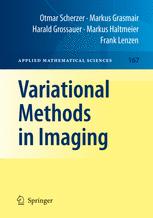

Most ebook files are in PDF format, so you can easily read them using various software such as Foxit Reader or directly on the Google Chrome browser.
Some ebook files are released by publishers in other formats such as .awz, .mobi, .epub, .fb2, etc. You may need to install specific software to read these formats on mobile/PC, such as Calibre.
Please read the tutorial at this link: https://ebookbell.com/faq
We offer FREE conversion to the popular formats you request; however, this may take some time. Therefore, right after payment, please email us, and we will try to provide the service as quickly as possible.
For some exceptional file formats or broken links (if any), please refrain from opening any disputes. Instead, email us first, and we will try to assist within a maximum of 6 hours.
EbookBell Team

0.0
0 reviewsThis book is devoted to the study of variational methods in imaging. The presentation is mathematically rigorous and covers a detailed treatment of the approach from an inverse problems point of view.
Key Features:
- Introduces variational methods with motivation from the deterministic, geometric, and stochastic point of view
- Bridges the gap between regularization theory in image analysis and in inverse problems
- Presents case examples in imaging to illustrate the use of variational methods e.g. denoising, thermoacoustics, computerized tomography
- Discusses link between non-convex calculus of variations, morphological analysis, and level set methods
- Analyses variational methods containing classical analysis of variational methods, modern analysis such as G-norm properties, and non-convex calculus of variations
- Uses numerical examples to enhance the theory
This book is geared towards graduate students and researchers in applied mathematics. It can serve as a main text for graduate courses in image processing and inverse problems or as a supplemental text for courses on regularization. Researchers and computer scientists in the area of imaging science will also find this book useful.